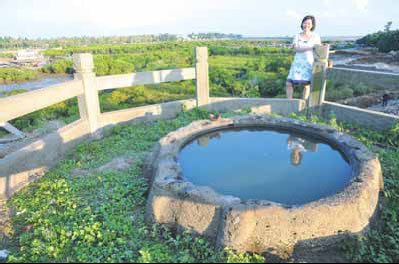Xuwen: Environment crucial, not industry
|
Han Dynansty signal fire pit dating back more than 2,100 years in the frontier county. Chen Beipao / for China Daily |
Impoverished county pins its hopes on eco-tourism
Governments in many impoverished regions often look to big manufacturing projects as a fast track to economic development.
But not in Xuwen, a poor county in Zhanjiang, Guangdong province, where local authorities have chosen a more sustainable model driven by eco-tourism.
A typical agricultural county, farming revenue accounted for half of the county's GDP of 12 billion yuan ($1.96 billion) last year, only 7 percent of Zhanjiang's total.
Manufacturing is said to be the key to making a fortune, but county Party chief Zhong Li believes that tourism is the most suitable path for Xuwen,
"Big manufacturing projects might drive up GDP in the short term but they may do harm to the environment," Zhong said.
In addition, he said Xuwen has neither a cost advantage nor a well-laid foundation for developing manufacturing facilities.
"But Xuwen is rich in tourism potential because of its pristine environment, landscape and a leisurely lifestyle totally different from big cities," he added.
Local wonders
Zhong noted a few of the local natural wonders.
It has the country's largest area and variety of coral reefs on the continental shelf.
The volcanic rocks along the beach at Sandun Island have been carved by wind and waves for more than 10,000 years, forming unique landforms like blossoming lotuses.
In cultural heritage, Zhong said Xuwen has a history of more than 2,100 years, with Han Dynasty (206 BC - AD 220) relics telling the past glory of the frontier county.
He said Xuwen was one of the important ports for the seaborne silk trade.
"Culture is the soul of tourism," said Zhong. But he recalled when he first visited the ancient port, he just saw shabby villages and local fishermen who didn't seem to know their hometown's glorious history.
The official said his ambition is to help develop tourism into the county's pillar industry. He expects it can account for more than 50 percent of local GDP.
Xuwen's highlight on tourism is in line with the Zhanjiang government's vigorous promotion of modern tourism in its 12th five-year plan (2011-15).
"The tourism industry is crucial to Zhanjiang's social transformation and economic development," Mayor Wang Zhongbing said.
"Zhanjiang enjoys unique resources to develop coastal, ecological-friendly and culture-themed tours.
"We should develop the industry - otherwise we should be ashamed of wasting the precious resources that our ancestors left for us."
Strong support
The city in southwest Guangdong province now has a golden opportunity to boost tourism due to strong support from the provincial government, which has selected the city to take the lead in Guangdong and honored Xuwen as the province's pilot county in tourism reform.
County authorities have already proposed innovative solutions in developing tourism projects.
Zhong said in the impoverished county, funding is always a bottleneck.
He recalled the government managed to invest 18.6 million yuan in the county's first scenic spot in 2009, and then sold the project to a developer the next year at a price of about 20 million yuan. The revenue was put into the construction of the county's second such facility.
"It's impossible for a poor county to keep investing big amounts of money in many scenic spots," said Zhong.
"The tourism resources in Xuwen are like unadorned beauties. Our strategy is to dress them up to attract admirers who see their potential of being developed into scenic spots."
Snowballing from the initial investment of 18.6 million yuan, the county government has been able to put more than 50 million yuan into tourism development in the past four years, one big project at a time each year.
It has signed contracts with developers worth more than 30 billion yuan. About 1 billion yuan has already been put into construction.
Eco-friendly
Zhong said all tourism projects are first based on protection of the local eco-system and environmental improvement.
For instance, the Longquan Forest Park has transformed 216 hectares of abandoned stony land into a tropical forest.
Its Longmen Eco-Tourism Village focuses on protecting the ancient camphor trees.
A key project this year is the restoration of tropical rainforest, which aims to build a summer resort and also alleviate the county's drought by planting more trees.
Zhong noted that the area before had tropical rainforests, but in the 1950s, large areas were wiped out to plant rubber trees.
"Xuwen then began to suffer droughts in the 1980s, which never happened before," said Zhong.
"Our development of tourism is based on a good environment. Promotion of eco-tourism is able to fuel restoration of the environment."
He said that the local government has turned down two big industrial projects - a paper making facility and a nickel plant.
"The total investment of the nickel plant was 10 billion yuan, while Xuwen's GDP last year was only 12 billion yuan. Our GDP would have soared if we accepted this project but we gave it up for the sake of the environment," said Zhong.
He is optimistic about the eco-tourism and not much worried about competition from Hainan province only 33 kilometers way across the sea.
"There may not be fancy hotels in Xuwen like those in Sanya. We target at the middle class and the working class instead of the rich. People can enjoy the most original taste of farming culture here in Xuwen," said Zhong.
"According to Chinese Academy of Social Sciences, the number of middle-class people will reach 600 million by 2020. They are our customers."
xujingxi@chinadaily.com.cn



















